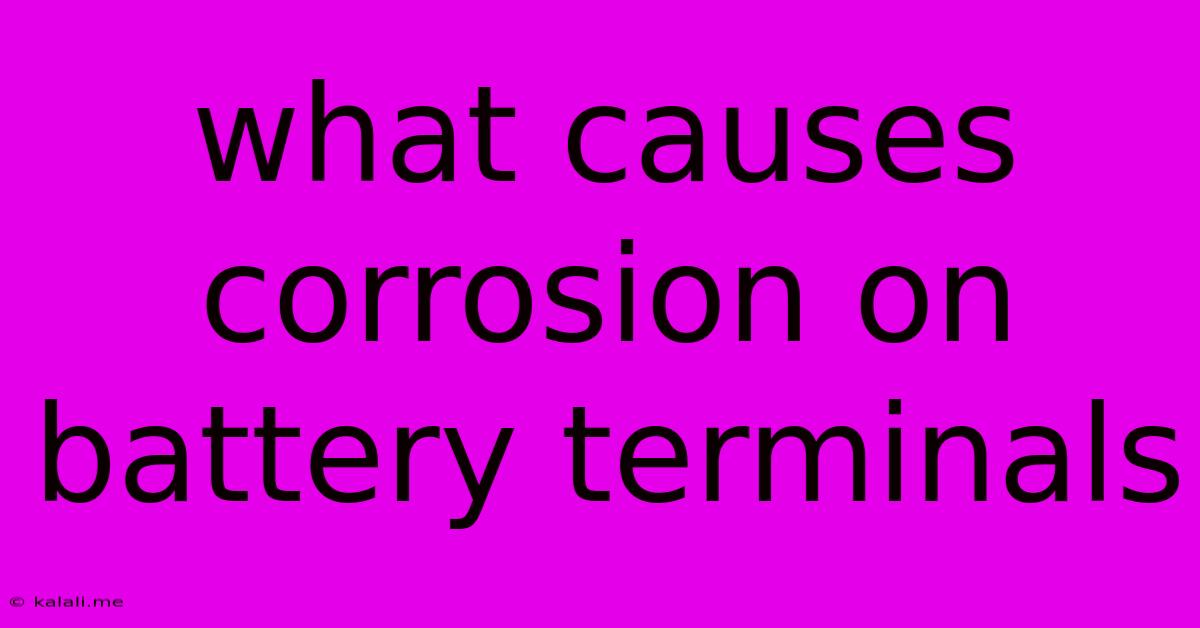What Causes Corrosion On Battery Terminals
Kalali
May 23, 2025 · 3 min read

Table of Contents
What Causes Corrosion on Battery Terminals? A Comprehensive Guide
Meta Description: Battery terminal corrosion is a common problem leading to poor engine starting and electrical issues. This guide explores the root causes, from environmental factors to internal battery issues, and offers preventative measures.
Car batteries are essential components, providing the power needed to start your vehicle and run its electrical systems. However, a common problem that can significantly impact battery performance is corrosion on the battery terminals. This corrosion, often appearing as a white, powdery substance or green/blueish crust, can hinder electrical conductivity, leading to a weak engine crank, dimming headlights, and eventually, a dead battery. Understanding the causes of this corrosion is the first step to preventing it.
Environmental Factors: The Biggest Culprits
Several environmental factors contribute significantly to battery terminal corrosion:
- Moisture: This is arguably the most crucial factor. Water, whether from rain, snow, or even condensation, acts as an electrolyte, accelerating the chemical reactions that lead to corrosion. The presence of moisture provides the necessary medium for the electrochemical processes to occur.
- Airborne Contaminants: Airborne pollutants, such as salt (especially near coastal areas), industrial chemicals, and dust particles, can react with the battery's metallic components, accelerating the corrosion process. These contaminants can settle on the terminals, creating a conductive path for corrosion.
- Temperature Fluctuations: Extreme temperatures, both hot and cold, can contribute to corrosion by influencing the rate of chemical reactions. Repeated cycles of freezing and thawing can also accelerate the process.
- Electrolyte Leakage: Battery acid (sulfuric acid) leakage from cracked or damaged battery cases can directly contribute to corrosion. This acid reacts with the metal terminals, causing rapid deterioration.
Internal Battery Issues: A Less Obvious Cause
While environmental factors are often the primary culprits, internal battery issues can also exacerbate corrosion:
- Overcharging: Overcharging the battery forces excessive current through the terminals, generating heat and accelerating the corrosion process. This excessive current can lead to increased chemical reactions at the terminal surface.
- Undercharging: Consistently undercharged batteries can generate sulfation, a buildup of lead sulfate crystals on the battery plates. This can increase the internal resistance of the battery, leading to higher current flow at the terminals and, consequently, increased corrosion.
- Battery Age: Older batteries are more susceptible to corrosion due to wear and tear on their internal components and a higher likelihood of electrolyte leakage. The internal components naturally degrade over time, increasing the chances of corrosion.
Recognizing and Addressing the Problem
Recognizing the signs of battery terminal corrosion early is critical. Look for:
- White, green, or blue powdery substance on the terminals.
- Difficulty starting the vehicle.
- Dim headlights or other electrical issues.
- Loose or corroded terminal connections.
Cleaning corroded terminals is a relatively simple process, often involving a wire brush and baking soda solution. However, severe corrosion might require replacing the battery terminals or even the entire battery.
Prevention is Key: Proactive Measures
The best approach is to prevent corrosion in the first place. Here are several preventive measures:
- Regular cleaning: Regularly inspect and clean your battery terminals. This can prevent minor corrosion from escalating into a major problem.
- Protective coating: Apply a battery terminal protector, such as dielectric grease, to prevent moisture and contaminants from reaching the terminals.
- Proper ventilation: Ensure adequate ventilation around your battery to prevent excessive moisture buildup.
- Regular battery testing: Have your battery tested regularly by a qualified mechanic to identify and address potential problems early.
By understanding the causes of battery terminal corrosion and implementing preventative measures, you can extend the lifespan of your car battery and avoid costly repairs. Addressing this seemingly minor issue can significantly impact your vehicle’s overall performance and reliability.
Latest Posts
Latest Posts
-
Can I Make Multiplayer Siblings Borderlords
May 25, 2025
-
Stripping Section In Middle Of Wire
May 25, 2025
-
How To Tell If Sausage Is Bad
May 25, 2025
-
Magento 2 Get All Products From Cart In Js
May 25, 2025
-
Can You Bring Hairspray On A Plane
May 25, 2025
Related Post
Thank you for visiting our website which covers about What Causes Corrosion On Battery Terminals . We hope the information provided has been useful to you. Feel free to contact us if you have any questions or need further assistance. See you next time and don't miss to bookmark.